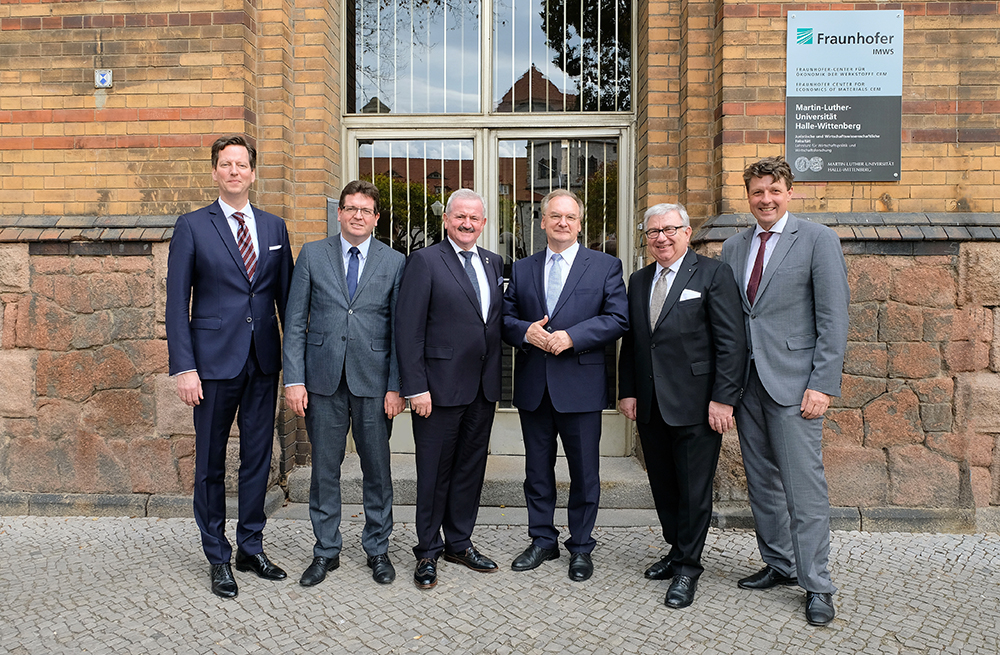The Fraunhofer Center for the Economics of Materials, a new addition to the portfolio of the Fraunhofer IMW
Through applied socioeconomic research, the experts at the Fraunhofer Center for International Management and the Knowledge Economy IMW in Leipzig develop solutions in support of the long-term success of customers and part-ners from the economy, industry and society. With a view to expanding the portfolio at the Fraunhofer IMW and bundling the competencies of the Fraun-hofer-Gesellschaft in the areas of techno- and socio-economic research, the Center for the Economics of Materials CEM in Halle, formerly based at the Fraunhofer Institute for the Microstructure of Materials and Systems IMWS, has now been transferred to the Fraunhofer IMW, better suited given their shared disciplines. Its incorporation also reflects the recognition by the Fraunhofer of the specific importance of the structural changes in society at large that have taken place in Central Germany.

The Center for the Economics of Materials CEM was founded in 2017 as a unit jointly run by the Fraunhofer Institute for the Microstructure of Materials and Systems IMWS and the Martin Luther University Halle-Wittenberg. With its expertise in techno-economic research, it makes an active contribution to the consolidation and development of competitive and locational advantages, the efficiency of resource usage and the creation of new business models. Experts from the CEM advise economists and politicians on questions ranging from industrial transformation to structures for an innovative and sustainable economy.
Securing the future and creating a regional model
Following its successful establishment as part of the Fraunhofer IMWS, the CEM has now been annexed as a branch institute to the Fraunhofer Center for International Management and the Knowledge Economy IMW based in Leipzig. The transfer of the CEM to the Fraunhofer IMW took place on January 1st, 2020. The head office of the CEM is still located in Halle (Saale). This means that the Fraunhofer IMW can now be found not only in Saxony but also Saxony-Anhalt.
Complementary competencies
The aim of this ambitious merger is to accompany structural changes through applied research and establish a profile as a competent partner in the regions involved. The comprehensive competencies of the Fraunhofer IMW are ideally supplemented by the technology-based and economic expertise of the CEM research unit. The Fraunhofer CEM can now look back on over 13 years of applied socioeconomic and socio-technical research and experience in national and international projects. It possesses proven competencies in the fields of the data and knowledge-based economy, innovation and technology management, the development of strategies and the internationalization of companies. The CEM research unit has developed wide-ranging competencies in the economic assessment of technologies and structural change. Through macroeconomic system analyses and quantitative policy impact research, the result has been the development of solutions for specific challenges faced during the transformation of industrial structures and technologies.
In the words of Prof. Thorsten Posselt, Director of the Fraunhofer Center for International Management: “The new unit in Halle expands our profile as the socioeconomic institute of the Fraunhofer-Gesellschaft. We will be able to accompany the structural changes and the ongoing transformation processes in Central Germany and further afield by sharing responsibilities and in coordination with industry, science, society and politics. Our expertise in knowledge and technology transfer, value creation networks, the knowledge-based economy and our understanding of the pressure to innovate will enable us to tap into the successful driving forces of paths for change. Together with our socioeconomic and economic expertise, we can become an indispensable partner for industry, society and politics in Central Germany.”